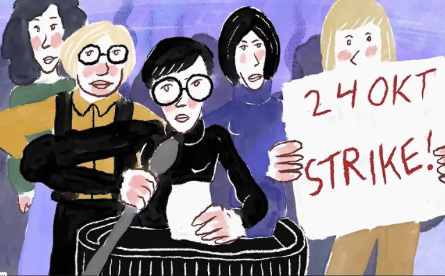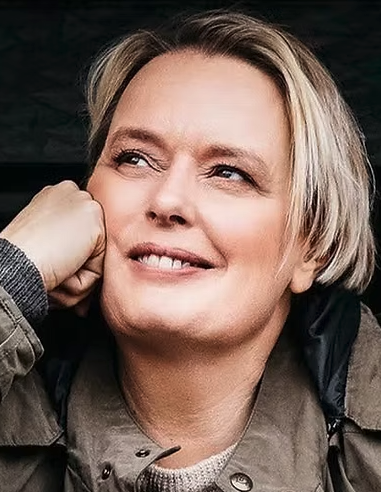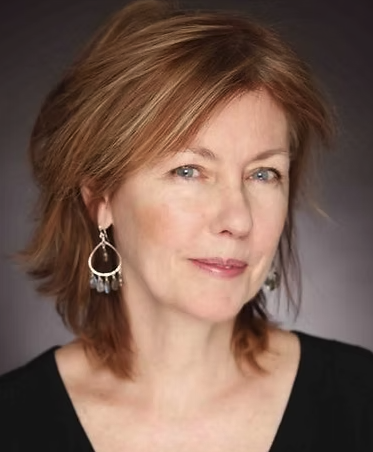Oct. 24, 2025 — 50 years ago today, 90% of Iceland’s women went on strike. Be sure to watch this revolutionary film that shows us what happens when women unite: “The Day Iceland Stood Still”
 Listen to the podcast on Inkandescent Radio
Listen to the podcast on Inkandescent Radio
Learn what happened: "The Day Iceland Stood Still"
"We mark this day regularly, and it always reminds us to ask: are we still moving toward full equality? What remains to be done?" asks the Ambassador of Iceland to the United States, Svanhildur Hólm Valsdóttir.

Monday Morning Magic from Inkandescent® PR + Publishing Co. — When 90% of Iceland’s women walked off the job and out of their homes the morning of Oct. 24 1975, the country came to a standstill. They refused to work, cook, or take care of the children; they brought their country to its knees and catapulted the island nation to its status as one of the best places in the world today to be a woman.
Fifty years later, we go inside the minds, hearts, and homes of dozens of those brave women in Pamela Hogan and Hrafnhildur Gunnarsdóttir’s groundbreaking film, “The Day Iceland Stood Still.” Watch the trailer above, and learn all about the project here: thedayicelandstoodstill.com
The movie is making waves around the world, including a showing on Oct. 8 at the National Press Club, where the filmmakers were joined after the screening in a panel discussion that included the Ambassador of Iceland to the United States, Svanhildur Hólm Valsdóttir.
 The Ambassador shares: “I’m so grateful to Hrafnhildur, Pamela, and Gríma for ensuring that the story of the women’s day off is told by the women themselves. Fifty years on, it’s vital to remember this remarkable moment of solidarity, when women across Iceland stood together and refused to accept lower pay or fewer opportunities. Their courage changed the course of our society, and we all continue to benefit from their fight for equality.”
The Ambassador shares: “I’m so grateful to Hrafnhildur, Pamela, and Gríma for ensuring that the story of the women’s day off is told by the women themselves. Fifty years on, it’s vital to remember this remarkable moment of solidarity, when women across Iceland stood together and refused to accept lower pay or fewer opportunities. Their courage changed the course of our society, and we all continue to benefit from their fight for equality.”
The women’s day off is still impacting Iceland, she believes. “We mark this day regularly, and it always reminds us to ask: are we still moving toward full equality? What remains to be done? The first Gender Equality Act was passed a year after the women’s day off. Since then, Iceland has introduced gender quotas on corporate boards, an equal pay standard, 12-month parental leave shared equally between parents, universal affordable childcare, gender budgeting, and gender assessments for new laws. Equal parental leave and affordable childcare probably play the biggest overall role in ensuring that people raising families can truly share both the responsibility of earning a living and caring for their children.”
About the film: Told by the women themselves and timed for release in the lead-up to the strike’s 50th anniversary, the filmmakers are on a mission to share the story that is subversive and unexpectedly funny. “We loved our male chauvinist pigs,” recalls one of the activists, “We just wanted to change them a little!”
“This is the true story of one day that changed everything,” explains Hogan, the U.S.-based director who campaigned as a high school student in the 1970s with her activist mother to pass the Equal Rights Amendment. Her partner in the project is Icelandic producer Hrafnhildur Gunnarsdóttir, who at the age of 7 accompanied her mother to that very strike in 1975 and thought that when she woke up the next morning “everything would be perfect.”
Hogan notes that while the E.R.A. never passed in the U.S., and Iceland still isn’t perfect – it’s the only country to have closed over 90% of its gender gap, and committed to reaching full equality in the near future. “The only thing new in the world is the history you do not know,” she says. “We hope this story will inspire viewers all over the world to reimagine the possible.”
Learn more:
- Don’t miss our Inkandescent interview with Pam and fellow filmmaker Hrafnhildur Gunnarsdóttir on Inkandescent.tv
- Explore thedayicelandstoodstill.com
- Watch the trailer!
- Check out our Q&A with the filmmakers, below!
 THE BACK STORY
THE BACK STORY
Icelandic producer Hrafnhildur Gunnarsdóttir shares:
Of course, it is always a win when we simply finish a film and it travels the world. As a filmmaker this means a lot that the film actually resonates with our audiences and is inspiring people to take action. This is why we make films.
In regard to my personal evolution, I can say this: In 1975, when I was 11years old, I got the idea from attending the Strike that day that everything would be “fixed”, that men and women would be equal from now on, and I would have the same opportunities as boys and men. Of course, it took a while, and the change is still in progress, but in retrospect, it gave me shoulders to stand on.
If that was true, I have no idea, but that is how I lived my life, and I have lived my life to the fullest, surely doing what I love, making films. I sometimes wonder what would have happened if I had not had that idea in my head, if the strike had not happened. Now, of course, my whole life has been a struggle to survive as a filmmaker, as an artist, but here I am, and this has been my career, and I think that is a win.
What I hope for the future generations of women and men in Iceland, and around the world, is that simply they would have the same opportunities and be equally compensated for their work. We are in the position of privilege in Iceland, we have gotten far, yet we are still fighting for equality, and that struggle will probably never be over. Unfortunately, the rest of the world has a long way to go. I know it is daunting to be behind, but we know from experience in Iceland that things can change, and they will. Make men your allies, create new thoughts ofy, and allow your an equal societself to dream of a better future.
 Film producer Pamela Hogan says:
Film producer Pamela Hogan says:
What made you want to make this movie: When I read about the story in the back pages of the Lonely Planet guide on a family trip to Iceland, my head exploded. I just thought, how can I NOT know this story? Then I thought of the words of Irish civil rights activist Bernadette Devlin: “It’s not that women are written OUT of history—it’s that we’re never written IN.” I didn’t have a choice. I knew I had to make the film, and it has been an incredible journey.”
What were the biggest challenges? Fundraising, of course. But on the creative side, one of the biggest challenges was finding archival footage—photos and film—to bring this 1970s moment of history to life. Most of the women didn’t have cameras, and those that did had said to me things like, “I don’t know why I didn’t think to bring my camera along when we entered the cow in the beauty contest.”
We have to realize this was not the era of selfies! Another challenge was finding a way to bring ordinary people—women and men —who were not activists but just living their lives—into the story. We wanted to paint a collective picture of Icelandic society in the early days of the 1970s women’s movement, and none of those people were on the record in any way, so it took a lot of research, a lot of cups of coffee with a lot of people, to find those voices.
Another huge challenge, she shares, was finding a way to convey the incredible pressure and criticism ICELAND’s 1970s feminist pioneers faced every day. “Today, Icelandic society has changed so fundamentally that either people don’t remember how much they scorned the feminist movement and the push for gender equality, or they don’t want to remember. So we ended up bringing in actors to voice critical editorials that appeared in the newspapers at the time.”
I think I’m most excited by the discovery that Iceland‘s feminists used humor to open people’s ears to their truly subversive message. I would even say they weaponized humor — and that made it a lot of fun to tell this story! And perhaps what I’m most proud of is that the women who shared their stories with us are happy with the film and feel that it truthfully conveys the spirit of their incredible movement.
Why do you think the women of Iceland were able to come together — and can others do the same today?
Well, it helps that October 24, 1975, was a sunny day, because that’s when the winds can be blowing so hard that roads are closed, and no one would’ve been able to come to the demonstration. I guess that’s why one woman’s son remarked, “Now I know that God is a woman!” Part of it, too, was that women in so many countries around the world in the early 1970s were coming together and fighting for change. As one of the Icelandic activists said to us, “We had sisters all over the place“. So there was a sense of joining a global movement whose time had truly come. Another key was the radical feminists’ willingness to compromise and call it a “day off “rather than a strike. Although some were disappointed and angry about the compromise and felt that it was a sellout, in the end, it’s why truly every Icelandic woman could participate that day, because the message was simply “we matter “.
What do you think is the future of women’s movements around the world in 2025?
I can only tell you about the excitement for this story that Hrabba and I have seen in festivals and screenings in so many different countries over the past year! Young women in South Korea were literally taking notes as they watched the film, determined to challenge patriarchy in their country. We screened the film in Dublin last week for women considering running for elected office in their countries, and they told us they drew inspiration from Iceland’s example. Later this month, on October 24, the 50th anniversary of the Women’s Day Off, the film will launch in theaters across Japan, where an executive committee has just been formed to organize a strike next March.